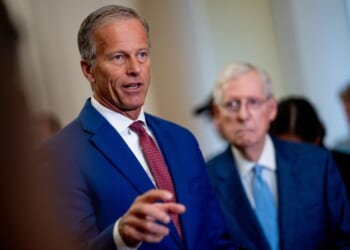It’s a delicate moment for Indian-Americans. They’re more visible than ever in US politics, including in the second Trump administration, which features such bold-face names as Usha Vance, Jay Bhattacharya, Harmeet Dhillon, Kash Patel, and Kush Desai, among others. Yet many on the young, hyper-online Right express frustration with high rates of migration from the Subcontinent that can, at times, bleed into overt racism.
For example, Nick Fuentes, the perma-smirking king of the racial Right, describes Usha Vance as a “foreigner” and a “jeet,” mocks her name (“what the fuck is that?”), and blames her husband for “race-mixing.” Fuentes, who boasts a million followers on X, is having a something of a moment, with Kevin Roberts, the president of the conservative Heritage Foundation, going to bat for him (before apologizing some half a dozen times). But many lesser e-pundits share Fuentes’s views; even a Department of Government Efficiency staffer has called for normalizing “Indian hate.”
At the intersection of these crosswinds stands Nikki Haley’s son, Nalin. The scion of one of America’s most prominent Indian families, he has shot to online fame in recent months, after he went public with his religious conversion (to Catholicism) and let loose his political opinions — ones that often clash with his family’s.
For one thing, Haley isn’t shy about venting his weariness of immigration of all kinds, not least from India. When Vivek Ramaswamy called for an “end [to] identity politics” this week, Haley replied, “End H1-B visas,” the program used by firms, especially in tech, to import latter-day indentured servants, more than 70% of whom are Indian.
“We don’t just stop illegal immigration,” Haley tells me by Zoom on Tuesday. “I think we need to stop legal immigration.” With green eyes, impossibly white teeth, and six-pack abs, he cuts a striking figure. He is well-versed in meme warfare and knows just how to “ratio” accounts much bigger than his own — that is, garner more “likes” for his replies than the original poster. Like that of the British-born progressive pundit Mehdi Hasan, with whom he’s repeatedly tussled.
When I mention his demand that Hasan be “denaturalized,” he interrupts: “and deported.” Tongue in cheek, surely? “No, I quite literally mean that. I’m often sarcastic, but not in this case. I mean, he hates America. If you hate America, you shouldn’t be in America. … Everyone wants to make it so complicated. That’s the thing with the past generation. They always talk about the rules, regulations, process. No, it’s simple. If you don’t like America, get out.”
That’s not how American naturalization works legally, and the e-Right’s calls to denaturalize and deport any immigrant who says the “wrong” thing clashes sharply with both constitutional writ and the spirit of the American tradition. And if that sort of thing were all that Nalin Haley stood for, he could easily be dismissed as just another online loudmouth (albeit, one who puts his name and face to his fulminations).
Yet behind his bravado is a serious-minded 24-year-old recent graduate emerging from the political shadow cast by his mother. Nikki Haley served as a lawmaker in South Carolina, became the state’s governor, and was tapped as UN ambassador by Donald Trump in his first term before unsuccessfully challenging him for the 2024 GOP presidential nomination. Her son’s rage — and that of his Gen-Z-male cohort — is a predictable consequence of policies promoted by that older generation of conservatives, who prized cheap labor and free-market dogma far above America’s internal stability and cohesion.
“‘It’s simple. If you don’t like America, get out.’”
Nikki Haley supported legal, merit-based immigration as part of a pro-business platform. Her son wants to close the border entirely. Nikki Haley believes “it is not that Israel needs America — America needs Israel.” Her son thinks “Israel is just another country, and if they want to have a better relationship with the United States, they need to stop interfering in our politics.” Nikki Haley believes in an expansive foreign policy. Her son wants to end all foreign aid “as long as we have unemployment, people below the poverty line, medical debt, and bad schools.”
These domestic ills aren’t abstractions to him. “My friend group from high school, all graduated, great degrees from great schools,” he says. “It’s been a year and a half, and not one of them has a job — not one. So I’m angry at that, because I’m having to try and help my friends get jobs when their parents got jobs immediately — not just after graduating college, but out of high school.”
Statistics bear this out: in September, the share of the long-term unemployed, those who’ve been out of the job market for more than six months, hit 26%, according to The New York Times, much of it driven by recent graduates. The jobs that are available for recent grads are often precarious or temporary. “So when you see a bunch of foreigners coming over here to take jobs that [my friends] wanted,” Haley says, “they have every right to be pissed, and I’m pissed for them.”
It isn’t about jobs alone. “I look at the housing market,” he says, “and I don’t see how I’m ever going to own a house. And I do very well for someone my age” — he works in finance on the South Carolina side of Charlotte — “and I still don’t see it.” Again, the generational discontent: “My parents bought their first house for $90,000. I mean, that house probably now is worth $400,000. How can we compete?”
Then there’s the rising crime and disorder. “I live in what is known as a very safe area,” he explains. “Yet someone got shot and killed outside my apartment complex a couple months ago. . . Outside my apartment in that same couple months, someone got jumped for a bad drug deal. And I’m tired of having to go to CVS to push a button for an employee to come unlock the toothpaste for me. Like, that’s ridiculous.”
Overall, the effect is akin to “living in some fake world, some fake TV show,” he says. “We are the United States of America, we don’t do this. Things should be safe. Things should work. People should have jobs. Houses should be affordable.” If the son of Nikki Haley feels this way, it’s not hard to imagine the depths of anger and despair among less privileged Zoomers, a reality that probably explains, at least in part, the cohort’s often-brutal political rhetoric.
Nalin Haley was four years old when his mother was elected to the state House of Representatives. But things really changed when she was first elected governor, in 2010. Nalin and his sister, Rena, he recalls, “didn’t know that we had to live in this big house that’s also a museum” — the governor’s mansion.
When they arrived, the main housekeeper asked the two children what they wanted to eat. “And you know, we were very simple. We were like, ‘Well, what do you have?’ And she said, ‘Everything.’ We, having grown up very simple, we just asked for grilled cheese.” By his own account, Nalin’s parents — the governor and her husband, the businessman and military officer Michael Haley — kept him humble. All through childhood, including the years spent in the governor’s mansion, he had to do chores and was expected to work summer jobs.
On matters religious, however, Nalin Haley had to carve his own path. Beginning when he was in fourth grade, his maternal grandparents, Indian-born Sikhs, lived with the family and served almost as surrogate parents amid the political storms of those years. “I had my parents being [Protestant] Christian, and my grandparents being Sikh. As a result, I was very confused.” Which of these faith teachings was true?
To answer that question for himself, Haley absorbed books on world religions when other kids were reading about cars and dinosaurs. Eventually, thanks in part to a spiritual experience he’s reluctant to divulge, he concluded that Christianity is the true faith. He would go on to attend Villanova University, a Catholic institution in Philadelphia. Yet it wasn’t until after graduation that he was received into full communion with the Roman church.
“If the immediate slate of political contenders on the Right aren’t up to the task, Nalin Haley is prepared to enter the arena himself.”
“I needed to research my own faith better in terms of the history, the early beliefs, the Church Fathers,” he says. “When I did that, I felt as though anyone who does that kind of research will walk away a Catholic.” In his choice of denomination, too, Haley is representative of his generational cohort of Gen-Z men, an influential subset of whom is turning to Christianity — and specifically, to liturgically traditional communions like Catholicism and Orthodoxy.
In parallel to his spiritual conversion, he also began to develop his own distinct political ideas — not always the case in other political families like, say, the Cheneys. “I was not just going to have the same political views as my parents,” he says. Yes, he supported his mother in the 2024 Republican primary, but he did this, he insists, mostly to be a “good son.” All along, “I didn’t and was never going to be an advocate for a view that I did not have.” He repeats this point several times, almost like a mantra — a loyal son, but not a political disciple.
Yet when it comes to his views on immigration, critics from both the Left and the Right insist on seeing him as something other than his own man. He’s received his share of racist abuse from the toxic sewers of the online Right, notwithstanding his Christian faith and hard-line restrictionist views on immigration. “I just don’t let it bother me,” he says. “The internet’s not a real place necessarily. It is in some sense, but it’s also not. … I know who I am.”
As for one of the main sources of the racist sludge, Fuentes, Haley insists he’s barely watched the former’s show and doesn’t know his views. “I have no idea what to say about him or what to think about him,” Haley says. “And none of my friends really know about him, either.” I find that hard to believe, given Fuentes’s enormous influence among Zoomers. Still, it’s a relief to hear Haley add that racial animus is out of the question for him: “As a Christian, I can’t have that. As a Christian, Jesus told me to love everybody, including groups of people who I don’t agree with.”
He goes on: “I get it from both sides. Someone who is biracial, only someone who is biracial can understand the feeling that … You can never feel one way or the other, because one way or the other, those two groups will never fully see you as them.” Christianity, it seems to me, serves as the bridge between these social realms for him — and could do so in an increasingly fractured American polity, if we’re lucky.
The Left, meanwhile, reproaches him for backing an immigration policy that, if it had been in effect when his grandparents immigrated from India, would have barred them from entry — thus, in a sense, foreclosing his own existence. That line, too, leaves him unfazed. “It’s not 1969,” he shrugs. “It’s just not. We have a different country. We have a different set of circumstances.” It’s reasonable, then, to “adapt” and to “have different policies.”
In 2025, “we have lawlessness, we have crime, we have unemployment. We have all these issues. So my first thought isn’t, ‘Well, what happened in the past, and how could we have changed the past?’ Because we’re not living in the past. We’re living right now. And so my thought is, ‘What can we do to stop the lawlessness, the unemployment, the housing crisis?’ ”
The 21st-century economy, he worries, won’t produce enough of the kind of high-wage jobs that defined middle-class prosperity in his parents’ and grandparents’ time. If the future is scarce service-sector jobs, why import more unskilled labor to undercut already low wages for such work among native-born workers? “A lot of people are just going to lose their jobs. They’re just going to be sitting around without jobs. And the next thing you know, you’re going to have people saying, ‘We need UBI,’” or universal basic income.
The economic pressure on his generation, he fears, will compound existing trends toward loneliness and alienation, especially between Gen-Z men and women.
“The future of division in America,” he speculates, “is not going to be about race. It’s probably not going to be about income, although that is a big disparity. It’s going to be about gender. It’s going to be men on one side, women on the other. If you look at someone’s” — algorithmically curated — “‘For You’ page on TikTok or on Instagram, for a young man it’s going to be completely different from a young woman’s.”
Gen-Z women are veering sharply to the Left: an overwhelming majority just voted for Zohran Mamdani in New York City. Meanwhile, Gen-Z men like Haley are shifting to the Right, and even the very hard Right that sometimes plays out as crass misogyny online, thus deepening the mutual alienation of the sexes. Yet, Haley wonders, it might not be as hopeless as all that, because both parties are responding to the same set of frustrations: “They’re tired of modernity. They’re tired of technology. All of this modernity is not natural to them.”
“Gen-Z men like Haley are shifting to the Right, and even the very hard Right.”
What both sexes desperately need, he says, is time together — in person. “They’re being more anti-social,” he observes of his cohort. “Their attention spans are getting shorter. So they only see what’s on the phone. That means that in terms of race, if all you see about a certain race is what you see on your phone, you’re going to have that view of them. If all you see about a certain gender is on your phone, you’re going to think that about them.”
He adds: “But make no mistake, the future of Gen Z, regardless of its men or women, is nationalist.” When I ask him whom he prefers among the suspected contenders for the 2028 Republican nomination, he suggests that JD Vance comes closest but says the vice president needs to “somehow work on his charisma, aura, and likability.” And if the immediate slate of political contenders on the Right aren’t up to the task, Nalin Haley is prepared to enter the arena himself.
“I want someone to fight for me,” he says. “And if no one’s fighting for me, then I’m going to fight for myself and those around me who are suffering.” His anger is often palpable. At times, it’s discomfiting. It’s also, I must admit, at least partly justified. Mere hectoring moralism, without more, will do little to assuage it. Reforming the material substrate beneath that generational rage should be the foremost task of both parties.

















